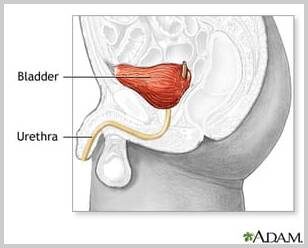
Neurogenic Bladder
Neurogenic bladder is a condition characterized by the loss of bladder function, which prevents people from completely emptying the bladder which leads to urinary retention. It can affect both males and females. For normal bladder function to occur, it involves a complex communication system between nerves and muscles to work together to tighten or release the bladder and surrounding muscles and allow urine to be released and expelled. A neurogenic bladder is often the result of problems with nerves in the body that control how the bladder stores or empties urine or from chronic obstruction that over time affects the bladder.
Causes of Neurogenic Bladder
Neurogenic bladder may develop after an accident or trauma to the brain or spinal cord. It can be idiopathic in that a cause cannot be determined. It can be seen in patients with underlying neurological disorders. It can also be seen in patients who have a chronic obstruction of the urinary tract. It can be a common complication of major pelvic surgery. Patients afflicted with the following conditions may also be at a higher risk for developing neurogenic bladder:
● Diabetes
● Cerebral palsy
● Alzheimer's disease
● Multiple sclerosis
● Spinal disorders
● Stroke
Symptoms of a Neurogenic Bladder
Some of the early signs of a neurogenic bladder may be recurrent urinary tract infections. Patients with neurogenic bladder may also experience the following symptoms:
• Urinary incontinence
• Painful urination (dysuria)
• Urine retention on bladder scan
• Frequent of urination with little output
• Incontinence with movement
• Feeling bloated
Diagnosis of a Neurogenic Bladder
A neurogenic bladder can be diagnosed by an examination of both the nervous system and the bladder itself. A thorough physical examination is performed and the patient's medical history is reviewed with the patient. A bladder diary may be helpful in identifying neurogenic bladder. The provider may ask about any underlying neurological problems such as back injury, stroke, MS or other neurological diseases. The following diagnostic tests may also be used to diagnose neurogenic bladder:
● Urodynamic studies or bladder function studies
● Cystoscopy to visualize the bladder
● Post void bladder scan
● CT scans
● MRI tests
● Consultation of neurologist may be ordered
Treatment of a Neurogenic Bladder
Treatment for neurogenic bladder may vary based on severity and complications. It may begin with frequent voiding, keeping bladder diary. Other treatments mat include the following:
● Antibiotics to treat infections as needed
● Kegel exercises to strengthen pelvic floor muscles or referral for pelvic floor rehab
● Intermittent catheterization to empty the bladder at regular intervals
● Electrical device implanted near the bladder nerves to stimulate the bladder muscles
● Suprapubic catheter
Prevention of Neurogenic Bladder
While all cases of neurogenic bladder cannot be prevented, behavioral changes may help in decreasing the severity of symptoms. It is also important to manage chronic underlying medical conditions. Recommendations may include:
● Limiting fluid intake to avoid putting stress on the bladder
● Modifying diet to avoid foods and beverages that may irritate the bladder
● Performing kegel exercises to help strengthen the pelvic muscles
● Treating underlying medical conditions
